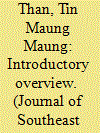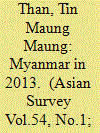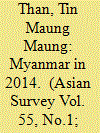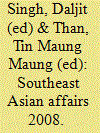|
|
|
Sort Order |
|
|
|
Items / Page
|
|
|
|
|
|
|
| Srl | Item |
| 1 |
ID:
132569


|
|
|
|
|
| Publication |
2014.
|
| Summary/Abstract |
President Thein Sein's government launched a series of political, economic and administrative reforms soon after assuming power in March 2011. The economic reform agenda emphasizes good governance, transparency and accountability while including measures for attracting foreign direct investment (FDI), liberalizing trade, enhancing regional economic cooperation, reducing the state's economic role, boosting productivity and balancing equity with efficiency. A more systematic exposition of reforms is the government's Framework for Economic and Social Reforms (FESR). With the removal of most of the Western punitive sanctions, liberalization of finance, banking, trade and investment sectors and replacement of the overvalued fixed exchange rate with a managed float, Myanmar, with its rich natural resources and virtually untapped market, has become the favoured emerging market for the international business community. However, the country's economic transition is not going to be smooth as there are many structural and other problems inherited from decades of mismanagement and neglect, as well as socio-political challenges. Meanwhile, little research on problems and issues in the various economic sectors is available to the reformist government, whose lack of capacity makes it all the more difficult to institute reforms. However, the returning international financial institutions, Western government-linked aid agencies and private consultancies have brought in expertise to narrow the information gap. In this special edition on Myanmar reforms, issues related to external trade, exchange rate, finance, banking, business environment and potential economic strategies, which are vital components of the reform agenda and crucial for Myanmar's sustained growth, are analysed.
|
|
|
|
|
|
|
|
|
|
|
|
|
|
|
|
| 2 |
ID:
130180


|
|
|
|
|
| Publication |
2014.
|
| Summary/Abstract |
The year 2013 in Myanmar saw parliaments disagreeing with the executive. A joint parliamentary committee to review and amend the Constitution was formed. Western sanctions were virtually withdrawn. A resurgence of communal violence, the emergence of Buddhist nationalism, and public protest over mega-projects, land rights, wage disputes, and freedom to demonstrate were worrisome developments. A nationwide ceasefire agreement remained elusive.
|
|
|
|
|
|
|
|
|
|
|
|
|
|
|
|
| 3 |
ID:
137914


|
|
|
|
|
| Summary/Abstract |
Myanmar saw some progress in efforts at constitutional amendment and ceasefire negotiations, both pressing issues. Attempts to introduce proportional representation failed in the lower house of Parliament. Critics pointed out stalled reforms. The economy achieved high growth, and foreign direct investment increased. Myanmar reveled in its role as ASEAN chair and host for President Obama’s visit.
|
|
|
|
|
|
|
|
|
|
|
|
|
|
|
|
| 4 |
ID:
083182


|
|
|
|
|
| Publication |
Singapore, Institute of Southeast Asian Studies, 2008.
|
| Description |
xxi, 393p.
|
| Standard Number |
9789812307903
|
|
|
|
|
|
|
|
|
|
|
|
Copies: C:1/I:0,R:0,Q:0
Circulation
| Accession# | Call# | Current Location | Status | Policy | Location |
| 053825 | 915.90305/SIN 053825 | Main | On Shelf | General | |
|
|
|
|
|
|
|
|
|